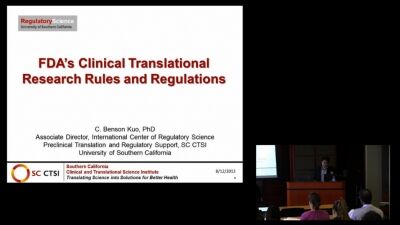Clinical and translational researchers investigating new drugs and devices must understand and master an enormously complex and constantly changing body of FDA regulations and other guidelines. These rules and practices seek to ensure public safety and the quality and effectiveness of drug, and to establish research priorities. They impact nearly all aspects of research on animal and human subjects. This Career Development Seminar Series on Regulatory Science presents six different experts in regulatory science, each discussing a different element of the requirements and responsibilities researchers must comply with. Lecturers outline the pertinent regulations and their intents, explain procedures for completing successful Investigational New Drug (IND) and other research applications; regulations regarding privacy and confidentiality for research participants; and regulations covering drug and device manufacturing, and for the conduct of the clinical studies themselves.
Regulatory Science Series (2013)
Six lecturers provide in-depth reviews of the federal FDA and other regulations and guidelines that govern all aspects of clinical and translational research on new drugs and biomedical devices.
Associate Director, Regulatory Knowledge and Support
Director of the D. K. Kim International Center for Regulatory Science & Professor of Regulatory and Quality Sciences, Department of Regulatory and Quality Sciences, Mann School of Pharmacy
Director of Research Compliance, USC Office of Compliance
Director of Clinical Research and the Clinical Investigation Center; Clinical Professor of Pediatrics and Pathology, Children's Hospital Los Angeles
Associate Administrator of Academic Relations Keck Medical Center of USC
Associate Professor, Clinical Pharmacy and Pharmaceutical Economics and Policy, School of Pharmacy
Course Syllabus/Topics
Lecture 1: FDA Clinical Translational Research Rules and Regulations (2:00)
This lecture introduces Regulatory Science and offers information about educational resources available at USC within the university's Regulatory Science Program at the School of Pharmacy. He outlines knowledge and skills within regulatory science that researchers must master, and explains how to identify key issues, including:
- How any particular research project fits within a planned clinical translational research process to address a clinical need for an identified populations.
- How to find relevant laws and regulations governing clinical translational research on the Food and Drug Administration website.
- How to recognize when an Investigational New Drug (IND) or an Investigational Device Exemption (IDE) application is needed for human research involving investigational products.
Resources
- Strengthening a workforce for innovative regulatory science in therapeutics development: Workshop summary (2012). The National Academies Press. Available at: nap.edu/catalog.php?record_id=13283
- Advancing regulatory science at FDA. A strategic plan. August 2011. Available at: fda.gov/downloads/ScienceResearch/SpecialTopics/RegulatoryScience/UCM268225.pdf
Course Syllabus/Topics
Lecture 2: Risk Assessment and Management Tools (1:53)
Risk assessment is a central element of the FDA's process of ensuring safety of the drugs and devices that are researched and marketed to the public. This session outlines concepts of Risk Assessment and Management Tools as formal processes within the regulatory framework affecting clinical translational researchers, focusing on:
- The definition of risk and a historical perspective of risk assessment and management
- Key players involved in evaluating risk
- Types of risk
- Risk Management Standards and Processes
- Examples of Risk Assessment and Management Tools
Resources
- US Department of Health and Human Services, Food and Drug Administration, Center for Drug Evaluation and Research, Center for Biologics Evaluation and Research. Guidance for Industry Q9 Quality Risk Management. June 2006. Available at: fda.gov/downloads/Drugs/.../Guidances/ucm073511.pdf
- International Organization for Standardization (IS0) 14971. Medical devices-Application of risk management to medical devices. Available at: osmundacn.com/asp_bin/downfile/20070718164118757_68.pdf
- FDA Medical Device Industry Coalition. ISO 14971: Overview of the Standard. Risk Management through product life cycle: An educational forum. Available at: fmdic.org/wp-content/uploads/2010/12/overview-risk.pdf
- Walker S et al. Developing a common benefit-risk assessment methodology for medicines – a progress report. Available at: cirsci.org/system/files/private/SRA_Dec%202011_Developing_Walker_McAuslane_Liberti%5B1%5D.pdf
- Institute for Safe Medication Practices, Example of a Health Care Failure Mode and Effects Analysis for IV Patient Controlled Analgesia (PCA).
Recommended background
- Buchanan RL, Dennis S, Miliotis M. Initiating and Managing Risk Assessments within a Risk Analysis Framework: FDA/CFSAN’s Practical Approach. Jornal of Food Protection.2004;67(9):2058-2062
Course Syllabus/Topics
Lecture 3. Rules Governing Confidentiality of Research Data and Research Participants (1:45)
Issues of patient privacy and confidentiality pertain not just within the physician-patient relationship, but also to the researcher-research participant relationship and to research data. Issues of privacy are more important than ever in an age when computers and electronic data can increase the impact of privacy breaches. In this lecture section, a lawyer and research compliance expert address the issues of privacy and confidentiality of research participants, with hands-on detail about HIPPA regulations, de-identified data, the role of the Institutional Review Board, (IRB), and the USC Office for Protection of Research Subjects, which oversees the university's Human Subjects Protection Program. Topics include:
- Definitions and importance of maintaining privacy and confidentiality for research participants, including their medical, personal and genetic data.
- The roles and guidelines of the Office for Human Research Protections, FDA, NIH, and HIPPA.
- The use of Certificates of Confidentiality to protect investigators and institutions from being compelled to disclose information that would identify research participants and to promote participation in studies by assuring confidentiality and privacy to participants.
- Balancing privacy rights and scientific need to share data.
- The USC Code of Ethics and Office of Compliance.
Resources
- The Office for Human Research Protections (OHRP) - oprs.usc.edu/rules/ohrp/ provides leadership in the protection of the rights, welfare, and wellbeing of subjects involved in research conducted or supported by the U.S. Department of Health and Human Services (HHS). OHRP helps ensure this by providing clarification and guidance, developing educational programs and materials, maintaining regulatory oversight, and providing advice on ethical and regulatory issues in biomedical and social-behavioral research.
- FDA Regulations for Good Clinical Practice and Clinical Trials - fda.gov/ScienceResearch/SpecialTopics/RunningClinicalTrials/ucm155713.htm
- Federal Policy for the Protection of Human Subjects (Common Rule) - hhs.gov/ohrp/humansubjects/commonrule/index.html
- US Department of Health and Human Services: Compliance Oversight Institutional Review Board Guidebook - hhs.gov/ohrp/compliance/index.html
- USC Office of Compliance - ooc.usc.edu/
- USC Office of Research - research.usc.edu/about/vp/
- USC IRB submission site i-Star - oprs.usc.edu/review/istar/
Course Syllabus/Topics
Lecture 4: Preclinical Toxicology Assessment (1:35)
Procedures governing toxicology in regulatory science are among the most important safety considerations in pre-clinical and clinical research trials, and ultimately in advancing proposed new drug products from bench to bedside. This lecture provides an overview of the regulatory and scientific requirements necessary to minimize the multiyear process of drug development. Topics covered include:
- Considerations in Investigational New Drug (IND) applications, including toxicology, genetic toxicity, carcinogenicity, developmental and reproductive toxicology (DART), and toxicokinetics.
- Role and use of animals in regulatory environment, including criteria for species selection in research, the Animal Welfare Act.
- Study design considerations for toxicology research.
- Relationship between dose and toxicity; adverse events; dose selection; dose response curve; routes and sites of exposure.
- In-vivo and in-vitro studies; common mistakes in drug safety research.
Recommended background
- The Thalidomide Tragedy: Lessons for Drug safety and Regulation. Helix Northwestern University.
- Chapman KL, Holzgrefe H, Black LE, Brown M, Chellman G, Copemen C, Couch J, Creton S, Gehen S, Hoberman A, Kinter LB, Maden S, Mattis C, Stemple HA, Wilson S. Pharmaceutical toxicology: Designing studies to reduce animal use, while maximizing human translation. Regulatory Toxicology and Pharmacology. 2013 March; 66:88-103.
Course Syllabus/Topics
Lecture 5: Current Good Manufacturing Practice (cGMP) (1:23) Current Good Manufacturing Practice (cGMP) are FDA regulations and guidelines designed to ensure that investigational new drugs, agents or devices meet standards of quality, safety and reproducible efficacy. But, as this lecturer explains, these quality standards must evolve and change with advances in technology and newly emerging safety issues or political decisions. Current GMP regulations are designed to assure quality of therapeutic agents, while allowing flexibility for manufacturers to change and improve drug or device products. Topics in this lecture include:
- The FDA's role and responsibilities in cGMP, and regulations covering methods, facilities, and quality controls used in manufacturing, processing and packaging of drug products.
- The elements and considerations in the creation of Exploratory IND and cGMP application for Phase 1 investigational drugs and agents.
- Additional FDA guidance documents providing additional clarity of the agency's current approaches for drug manufacturing and testing.
- Understanding the FDA's mechanisms to identify the most promising candidates under study at research institutions, to allow reduced time and resources to advance to clinical trials.
- FDA inspections and communications with researchers and manufacturers.
Resources
- Sample warning letters sent to pharmaceutical company from Department of Health and Human Services regarding pharmaceutical manufacturing facility audit findings or drug product concerns.
Recommended background
- US Department of health and Human Services. Guidance for Industry: CGMP for Phase 1 Investigational Drugs. 2008 July; 1-17.
- US Department of health and Human Services. Guidance for Industry, Investigators, and Reviewer: Exploratory IND Studies. 2006 Jan; 1-13.
Course Syllabus/Topics
Lecture 6. Investigator's Brochure, Protocol and Data Collection Forms for Regulatory Compliance (52 min)
The Investigator's Brochure (IB) and Study Protocols, created by the sponsor of a new drug or agent, are parts of the package of information submitted to the FDA for Investigational New Drug applications. They include information intended to guide clinical investigators studying the drug or agent, and compiles all relevant clinical and non-clinical data to support study of the drug in human trials. In this lecture, a specialist in regulatory science discusses the required elements of the IB and the Study Protocol section, such as:
- IB outline of procedures for new molecules, such as chemical structure and properties, storage, handling, similarities to other compounds.
- IB summary of animal studies, including findings regarding toxicology, dosages, route of administration, intervals, and post-exposure follow-up.
- IB summary of human studies, including risks and adverse reactions, recognition and treatment of adverse reactions; other precautions for clinical trials.
- Development of the Study Protocol, using information from the IB to create an investigator's guide for clinical trials.
- Data collection and use of Case Report Forms; the REDCap online data collection and management tool.
FAQ
Yes. Participants who complete the course receive a Certificate. Participants must watch the videos and attend the in-person session.
No. In addition to K Scholars, this course is open to faculty, clinicians, community health workers, fellows, post-docs, TL1 and F trainees, as well as medical, OT/PT, pharmacy and other students who intend to conduct clinical and translational research.






